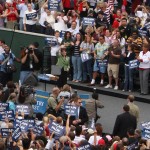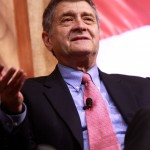I think I can understand Tracey McKenzie’s sense of relief as a Christian historian in his move from a secular public university to an evangelical liberal arts college (here are some other folks to weigh in on Christian higher education and academic freedom):
When it came to matters of faith, the university’s unwritten policy was a variation of “don’t ask, don’t tell.” It celebrated racial and ethnic diversity relentlessly but was never all that enthusiastic about a genuine diversity of worldviews, at least among the faculty and in the curriculum. If you espoused a vague “spirituality” that made no demands on anyone–or better yet, seemed to reinforce the standard liberal positions of the political Left–all well and good. Otherwise, it was best to remember that religious belief was a private matter that was irrelevant to our teaching and our scholarship.
For twenty-two years I accommodated my sense of calling to this secular dogma, bracketing my faith and limiting explicit Christian expressions and Christian reflections to private conversations with students who sought me out. In his book Let Your Life Speak: Listening to the Voice of Vocation, Parker Palmer writes movingly about the costs of such segmentation. Vocation is a calling to a way of life more than to a sphere of life. “Divided no more!” is Palmer’s rallying cry.
If I were to characterize my experience since coming to Wheaton five and a half years ago, these are the words that first come to mind–divided no more. Wheaton is not a perfect place, nor did I expect it to be one when I came here. But I can honestly say that I have experienced much greater academic freedom at Wheaton than I ever did at the secular university that I left.
McKenzie writes this in the particular context of the debates over Larycia Hawkins, a political science professor who affirmed over a month ago that Christians and Muslims worship the same God and touched off a controversy of some note.
I say I understand because having to be careful about one’s personal convictions, and not talk about your opinions on campus, can be artificial.
At the same time, the idea of academic freedom was an ideal that went with the integrity of academic disciplines. Academic freedom as it developed during World War I in the United States was a policy that protected professors from outside interests (religion and politics) so they could teach their disciplines freely. A history professor lecturing on Abe Lincoln would not have to worry, ideally, about the access to the president of the university that a wealthy Republican donor might have if said donor didn’t like what the professor said about Lincoln.
But academic freedom did not mean that this history professor had the liberty to lecture about Napoleon or Constantine. It was designed to protect the professor’s scholarly expertise.
If Wheaton decides to impose some sort of penalty on Larycia Hawkins for what she said about Christians and Muslims, can they be clear that they are doing so because Professor Hawkins spoke outside her academic discipline? Instead of talking about political science she opined about theology? Should Wheaton tell her to leave theology to the Bible and theology departments and just stick to politics?
And if Wheaton did that, there goes the integration of faith and learning that has so animated evangelical higher education for the last 35 years ever since Francis Schaeffer made Abraham Kuyper sexy. When evangelical administrators said that they wanted their faculty to reflect on the way faith informed scholarship and teaching (history, English, philosophy), they opened the Pandora’s Box that Wheaton College now faces with Larycia Hawkins. They gave a green light to professors, many of whom had at best a Sunday school understanding of Christianity, to talk about theology in fields of study distant from theology.
That doesn’t do justice to theology or to academic freedom.












